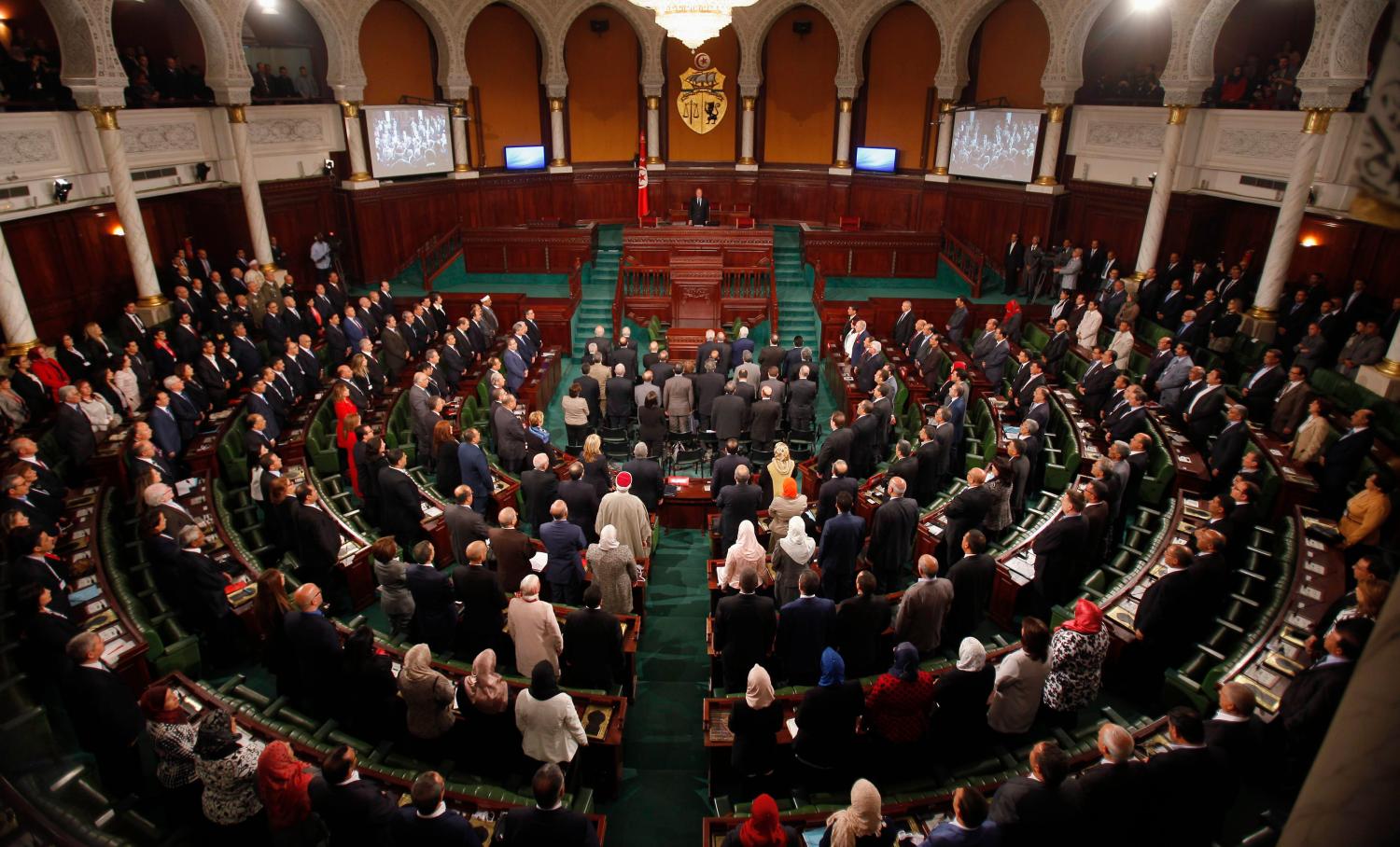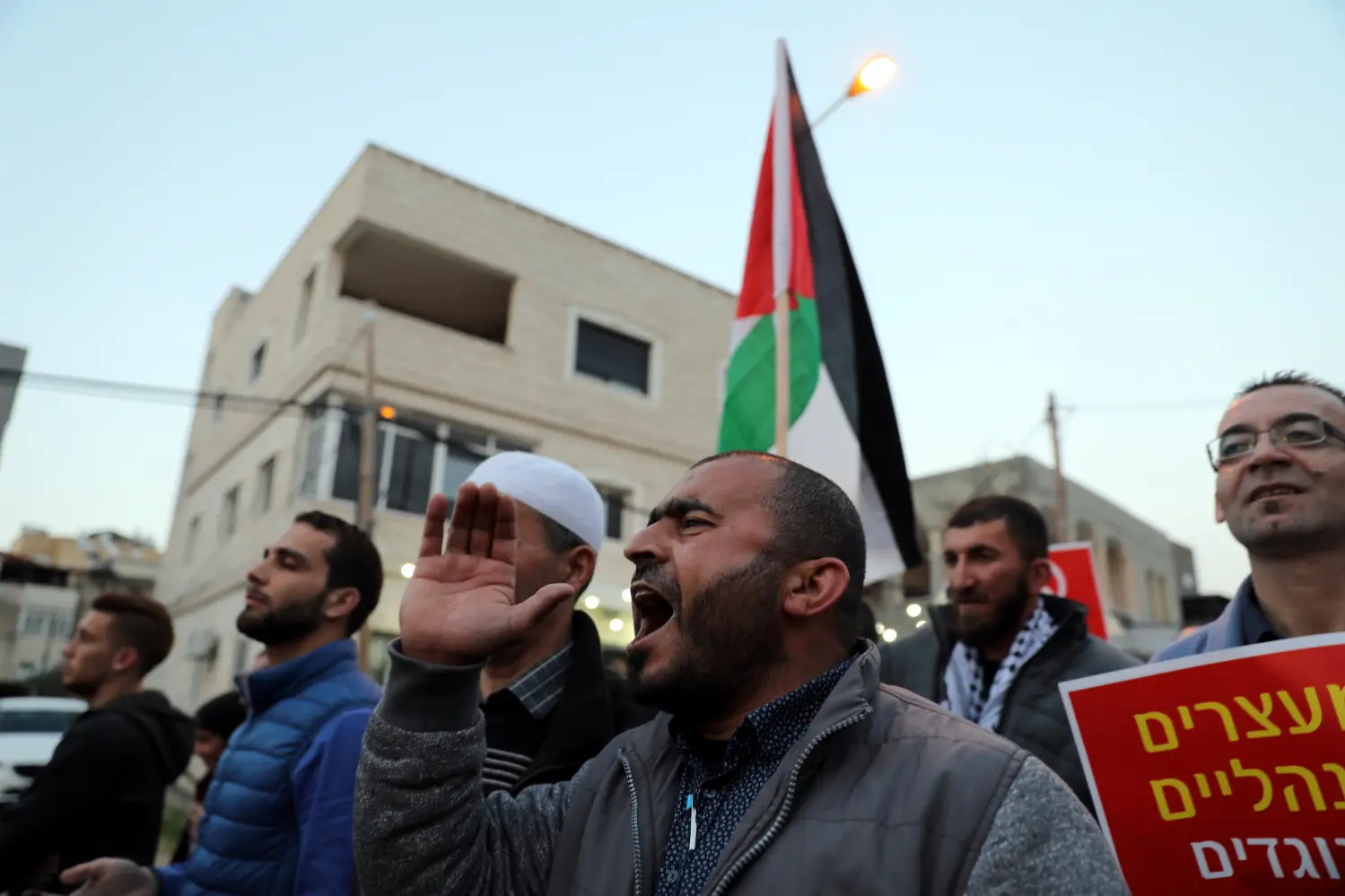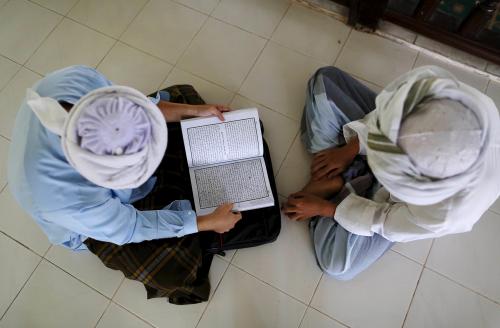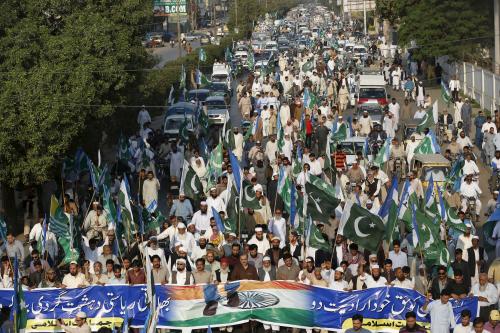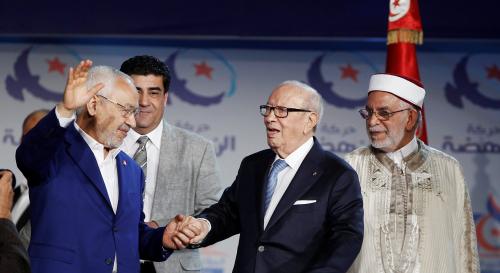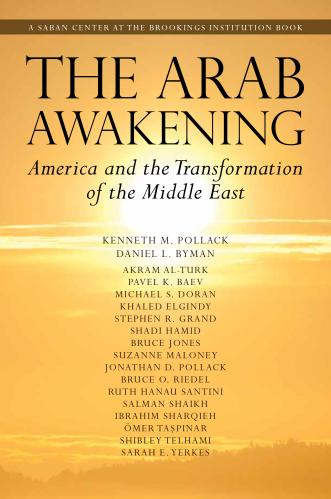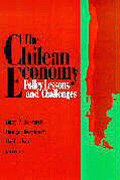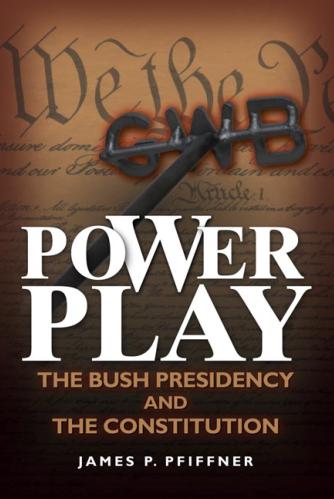As an Ennahda member of the parliament in Tunisia, I’ve always been interested in how we’re portrayed both by the academics who study us as well as the media. I’ve often felt a strong discrepancy between what we would read about ourselves, as an Islamist party, and who and what we actually are.
In this piece, I would like to address some of the issues raised by Monica Marks1, Avi Spiegel2, and Steven Brooke3 in their contributions to Brookings’ Rethinking Political Islam initiative. First is the very identity of Ennahda and why it is important to further discuss the supposed Muslim Brotherhood paternity of our movement. Second, I focus on what the failure of the “legalist” approach means for the next generation of Egypt’s Muslim Brotherhood, and its consequences for the rest of the Arab world. This will also be an occasion to reinterpret the real impact of the Egyptian coup of July 3, 2013 on the Tunisian transition. The last section rethinks how we label a party like Ennahda, and asks whether “Muslim Democrat” might be a more accurate description of the party’s orientation, rather than the traditional designation of “Islamist.”
Ennahda: the Tunisian Muslim Brotherhood or Bourguiba’s illegitimate child?
I think that it is time to recognize that the traditional approach which links all contemporary Islamic values-based political parties to the Muslim Brotherhood as a sort of “parent company” has reached its limits, especially in light of recent decisions taken by these parties. The founding context of Ennahda is more complex than a tentative of importation of Hassan al-Banna’s ideology into Tunisia by Rached Ghannouchi. The very nationally grounded trajectory of the founders of the Islamic Tendency Movement (which later became Ennahda) says a lot about the local characteristics of the Tunisian Islamic movement.
Much can be gleaned in this regard by examining the intellectual and religious origins of Tunisia’s Islamic movement. For instance, the two main founders of Ennahda, Abdelfattah Mourou and Rached Ghannouchi, were both graduates of Zaytouna University, the first Islamic university in the Arab world. Founded in 737, it gained a reputation for being responsive to the changing needs of society. Understanding this is significant, as Abdelfattah Mourou’s spiritual father is Sheikh Hmed Ben Miled, a Zaytunite, rather than Sayyid Qutb as many may erroneously assume. Ben Miled played a key role in Tunisia’s national liberation movement. He was heavily engaged in the struggle for the modern Tunisian state and a supporter of the state institutions that formed its bedrock. There is a famous picture of Miled with a group of scholars from Zaytouna in front of the Parliamentary building, taking part in legislative consultations during Bourguiba’s regime.
In the movement’s early years, Ennahda’s religious circles were oriented towards Sheikh Tahar Ben Achour’s teaching and legal judgements. A president of Zaytouna University and adherent of the Maliki school of jurisprudence, Ben Achour was one of the modern fathers of a more rationalist approach towards Quran exegesis (tafsir) which emphasized the importance of maqasid al-sharia, in other words the objectives or ends, rather than the means, of Islamic law. An arch-enemy of the traditionalists, he was pushed out of the university in 1960.
Many Ennahda leaders, such as Rached Ghannouchi himself, also participated in the rehabilitation of the controversial scholar Tahar Haddad against traditionalist pushback to his ideas. Haddad wrote against the more conservative scholarly wings of Zaytouna in his book Women in Shari’a and Society. He also held politically progressive positions on trade unions and social welfare. These are just some of the figures who shaped a distinctly Tunisian progressive and rationalist approach towards sacred texts, providing fertile ground for Habib Bourguiba to proceed with the modernization of state law, especially with regards to social and personal statutes.
My aim here is not to deny the influence of thinkers whose ideas traveled beyond their borders, such as those of Hassan al-Banna, or of the supranational fora where Islamist parties gather, debate, and exchange ideas, but rather to note that the impact of such factors is not as decisive as one might think. That said, they were certainly important at the intellectual level, and the plethora of Egyptian Muslim Brotherhood publications were the main philosophical “food for thought” of the Tunisian movement, which subsequently carved re-interpreted that literature in the context of its own unique, local ideological environment.
It is my belief that the “Grand Soir” of Islamist movements is more a post-hoc construct rather than a real (and realizable) objective of political actors who have, in reality, showed much more pragmatism than originally prophesized. One could even go so far as to say that Ennahda’s founding generation were the illegitimate children of Bourguiba, insofar as they subscribed to the idea of a struggle for national independence, the necessity of a social renaissance, and the importance of modern governance tools.
As Monica Marks notes in her working paper, “Tunisia’s Ennahda: Rethinking Islamism in the context of ISIS and the Egyptian coup,” Ennahda members consider themselves different from the Muslim Brotherhood both at the ideological and political level.4 Despite this, after the 2011 revolution, there is still the tendency among a range of analysts to consider Ennahda as simply the Tunisian branch of the Muslim Brotherhood. This has led to a misinterpretation of the path the party has taken since 2011. Furthermore, in Ennahda’s case, being able to experiment with four years of actual political governance has had more impact on its identity and political discourse than decades of underground activity.
The approach and objective of integrating within the state is to secure the presence of the party not only as a legal, “normal” entity but also as a legitimate political force able to both design public policies and to implement them. To change things from outside of the system, has been an illusion that most political parties, Islamist or otherwise, no longer believe in. The process of ownership is long and necessary. As for Ennahda, this process began in 2011 with the party’s legalization and its first experience in leading a coalition government with two secular parties.
Many Islamist political parties (like in the case of Morroccan’s Justice and Development Party, or PJD) are setting up a range of new activities and strategies, demonstrating the sort of long-term vision these political formations want to develop, far from the unpredictable counter-reaction of a system in transition.
During Brookings’ US-Islamic World Forum in Doha in June 2015, we had the opportunity to discuss and debate with other young Islamist activists from across the Middle East (Egypt, Morocco, Turkey, Saudi Arabia, Kuwait, Jordan), whether in power or in the opposition.5 It brought out the local nuances of positions and plans in each country. Even if we aren’t always looking for examples to follow from outside our own national contexts, other models can be instructive as counter-examples, signposts to avoid pitfalls. But some of these experiences can also inspire. For example, Ennahda, the Turkish Justice and Development Party (AKP), and the Morocc PJD have accumulated significant experience in successful state-driven economic development.
I always find myself surprised when analysts express surprise at the pragmatism of these parties. There seems to be an implicit expectation that these groups will behave like secretive and archaic religious brotherhoods, even then the entire expressed purpose of these groups is to govern and to participate in the shaping of public policy. For example, Ennahda’s tazkiya process (whereby which party members “vouch” for prospective applicants) has been more or less transformed into a simple non-binding recommendation. Many other “management”-type strategies are being modernized as the separation process between the party (hizb) and the movement (haraka) progresses.
It is time to look deeper at the professionalization of political parties in the Middle East, especially those in transitional countries like Tunisia. Within Ennahda, we consider the debates about the identity of the state, society’s national project, and the relationship between religion and politics (including the place of sharia in the hierarchy of norms) to have been resolved during the constitutional process of 2011-2014. The resulting constitution, one which Tunisians are quite proud of, is a text which is unlikely to be significantly amended anytime soon, especially after four years of charged and thorough debate around the document’s provisions. In fact, political parties who were still campaigning on these potentially divisive topics during the 2014 parliamentary elections were roundly defeated. Even Hamma Hammami, the candidate from the far-left party, the Popular Front, found it necessary to reassure voters that he was Muslim and that he loved the Prophet Mohamed during a television interview without even having been asked about it. Interestingly, Nidaa Tounes – a party defined by its anti-Islamism – relied heavily on religious rhetoric during the parliamentary and presidential campaign despite its “secular” label. I remember one of their young members, after a political appearing in a debate with us on France 24, telling me that French journalists should stop calling them “laique” (supporting the separation of religion from politics) because they are not and do not want to be seen as such by Tunisians.6
The maturity of parties like Ennahda is also apparent through the sorts of subjects they raise in public debate. It’s no longer a matter of the relationship between Islam and state anymore, or traditionally “Islamic” issues, but rather a commitment to finding solutions to corruption, economic development, social issues, and human rights.
The failure of the “legalist” approach and the consequences the Egyptian coup had in Tunisia
The failure of the legalist approach of Egypt’s Muslim Brotherhood has had a significant impact on the way a young generation of Arabs, regardless of their political preferences, see institutions and political systems. For the Islamists among them, it seemed that despite their efforts to understand and play by the rules, they would never be accepted. Decisive results at the ballot box could be contested. Elections were not a genuine means to access power. Moreover, the brutality of military repression is heightening feelings of defiance among Islamists toward the state and its institutions. More than a military coup, the events in Egypt represent a major missed opportunity to reconcile a whole generation with the state.
The risk of violent reaction from the younger generation cannot be dismissed, though it is worth noting that, since the coup, the pro-Brotherhood student organizations that are still demonstrating against military oppression have been careful not to fall into the trap of using violence. That said, there is a correlation between the military coup and subsequent crackdown and the rise of ISIS and other extremist groups in Egypt. Violence begets violence, and this infernal cycle is nourished by dictatorship, whether based on military power, secular ideology, or Islamic rhetoric. We shouldn’t be surprised by the loss of credibility of much vaunted “universal values,” which weren’t strong enough to protect democratic transitions, human rights, and individual liberties in much of the Arab world. This failure has led to a loss of faith in democracy as the way to manage a society or as a good system for power sharing.
We usually read that the Egyptian coup essentially induced Ennahda’s decision to step down and accept the handing over of power to a technocratic government whose main mission was to organize legislative and presidential elections within a year’s time. This has often been interpreted as a surrender on Ennahda’s part, with the ouster of the Muslim Brotherhood in Egypt as a kind of turning point in Ennahda’s thought. I think that this view doesn’t quite capture the full picture and tends to forget several important things.
Initially, the start of the Tunisian political crisis of summer 2013 wasn’t triggered by the coup in Egypt but rather by the assassination of Mohamed Brahmi, a prominent leftist politician. This re-ignited the country’s previous crisis of February 2013, following the assassination of the politician Chokri Belaid. Though the Egyptian coup may have accelerated the process and reinforced the demands of the secular opposition, the confrontation inside Tunisia preceded the removal of Mohamed Morsi from power.
But, more generally, we need to go back to the very start of the democratic transition in 2011 to better grasp how events unfolded. Consider, for example, the attitude of Ennahda since the October 2011 elections, after which the party decided not to govern alone and to instead share power with two very ideologically different parties, the secular nationalist Congress for the Republic (CPR) and the socialist Ettakatol. I consider this a continuation of a process which started in 2005 with the 18th of October Collectif, when various parties from the opposition to President Zine al-Abidine Ben Ali decided to launch an inclusive dialogue process to reach consensus on fundamental issues.
The conclusions of these discussions were published in a book, which summarized areas of agreement on core concerns, such as the civil character of the state, the nature of the regime, the importance of civil liberties, and women’s rights.7 In other words, sharing power and prioritizing dialogue over exclusivism was part of Ennahda’s philosophy well before the Egyptian coup and even the uprisings of 2011.
Since the start of the democratic transition, it was not unusual to hear Rached Ghannouchi speaking about the importance of making the process as inclusive as possible, regardless of the political weight of the various parties. This, he argued, was the best way to secure the transition. A desire to minimize political resistance to democratization by inviting the maximum number of political actors to participate reflects a clear commitment on the part of Ennahda leaders. Political inclusion is highly valued by Ghannouchi and party leaders as a tool to reinforce democratic institutions. The polarizing nature of the lustration debate in 2013 – over whether or not to bar old regime figures from electoral participation – led us to further conclude that exclusion couldn’t be the solution if we wanted to sustain the health and stability of the transitional process. The Libyan and the Iraqi experiences of lustration played an important role as counter-examples, helping to convince Ennahda parliamentarians to vote against the proposed electoral exclusion law to avoid a similar scenario. Given all of this, it shouldn’t be surprising to see Ennahda calling for unity and inclusion. As the head of a list of candidates in the parliamentary elections, I campaigned on national unity, defending the proposal for a national coalition government. To be sure, it required considerable time and effort to explain to voters the necessity of bringing in as many political forces as possible to support vital economic and social reforms. It’s not necessarily easy to campaign for the benefits of a complex and unusual political balance.
These positions were taken in consultation with Ennahda’s Shura Council after an intense internal debate. The negative path taken by the Libyan revolution, the deteriorating situation in Iraq, and the internecine conflict in Syria ended up convincing the majority of Tunisians that lustration isn’t always a solution to political crises, such as the one we were facing at the time.
Another thing to keep in mind is that the major threat before Ennahda at the time was the dissolution of the Constituent Assembly and the exclusion of the party from the constitutional debate. Irrespective of anything else, this could have derailed the entire democratic process. Ennahda, however, managed to secure the constitutional process by ensuring that the constitution was finalized under the Ennahda-led government of Ali La’arayedh before handing over power to a temporary technocratic government. This achievement is viewed by Ennahda as a success. The Egyptian scenario played the role of an a posteriori counter-example in forming legitimate Ennahda decisions.
The meaning of being a Muslim-Democrat political party in the 21st century
When Rached Ghannouchi first used this term, it was an effort to help the media understand the pitfalls of instantly and unanimously labeling diverse political actors as Islamists, despite their differences. Highlighting the parallel with Christian-Democratic European parties, like Germany’s Christian Democratic Union (CDU), seemed to be the easiest way to signify Ennahda as a political party bringing together both democratic principles and religious values.
Many, both inside and outside of Ennahda, were initially surprised by this new label and began to wonder what changes, if any, it implied at the political level. The fact is we can no longer use a term so charged with negative connotations when describing what we consider to be one of the most positive phenomena taking place in the Muslim World today. For the vast majority of Muslims, ISIS and its ilk are those who misinterpret and abuse Islam and use religion as a marketing tool for unspeakable, inhumane acts and for a brutal war for territory with no end. We believe we have a critical role to play in countering ISIS. The Islamic scholars which Ennahda members consider as references are serious and legitimate sources of religious interpretation when it comes to positions on violence, barbarity, the modern state, civil liberties, and the objectives (maqasid) of sharia.
It would be a waste of quite a lot of time and energy for us to take up the task of constantly distancing ourselves from a violent and dangerous ideology which is precisely the sort of model we are fighting against. No one, for instance, would seriously link the French socialist president François Hollande with Georges Cirprani, the historical leader of the terrorist group Action Directe, despite both of them hailing from political groups which claim inspiration from the same ideology. We unfortunately are not afforded the same treatment, and must therefore make our differences with ISIS and other extremists clear to all.
In a nutshell, Muslim-Democrat is the most accurate term to describe what Ennahda is trying to accomplish since the beginning: reconciling Islam and democracy in the Arab world.
Monica Marks responds:
In March, Ennahda Member of Parliament Sayida Ounissi contributed a rich reflection to the Rethinking Political Islam series. Her remarks presaged key decisions taken at Ennahda’s 10th congress, held May 20-23. Here, I’ll engage briefly with just two of the fascinating themes Ounissi raised—Ennahda’s integration as a Tunisian actor and the re-labelling as “Muslim democrats”—and connect those themes directly to Ennahda’s recent congress.
Ounissi first confronts accusations—common amongst secularly oriented Tunisians who have opposed Ennahda on ideological grounds—that Ennahda was birthed in the Mashriq (Arab East) and lacks proper Tunisian bona fides. Instead of representing the local branch of a shady international Muslim Brotherhood cabal, though, Ounissi argues Ennahda has pursued a “very nationally grounded trajectory” since its inception, guided by leading figures in Tunisia’s reformist and Zaytounian schools of thought.8
Ounissi’s emphasis on the “Tunisianness” of Ennahda’s intellectual history formed an essential sub-theme at Ennahda’s tenth congress. In his opening address on May 20, party president Rached Ghannouchi claimed Ennahda’s support for unity and national reconciliation is not a “safqa taht al-tawila” (under the table deal) but anchored in Ennahda’s view of Tunisian history:
Ennahda is a force for unity and togetherness, not for separation and division. So we see Khaireddine al-Tunsi, Ahmed Bey, Moncef Bey, the late za’im [leader] Habib Bourguiba, Farhat Hachad, Abdelazziz Thaalbi, Salah Ben Youssef, Sheikh Mohamed Tahar Ben Achour, and Tahar Haddad, God’s mercy be upon them and others, as symbols of our beloved nation.9
Ghannouchi asserted—before a crowd of 13,000 nahdawis (Ennahda members) and on national television—an inclusive re-remembering of Tunisian history, one that embraced both former president Habib Bourguiba (president from 1957 to 1987) and his arch rival Salah Ben Youssef, politicians whose struggle for control of the anti-colonial movement foreshadowed important class-based and cultural rifts between Tunisia’s interior and coast—rifts that divide demographics favoring Ennahda and Nidaa Tunis.
Despite the pride of place Bourguiba holds in Tunisia’s collective memory, some Tunisians—particularly those from interior, more religious, and more Arabophone backgrounds—resent the favoritism he showed Tunisia’s sahel (northern coastal) regions and steps he took to weaken Tunisia’s traditional religious institutions. Ennahda supporters have historically been amongst such critics of Bourguiba, not least because of the hostility with which Bourguiba approached Ennahda and its leaders throughout much of the 1980s.10
In his 2014 campaign for president, Beji Caid Essebsi played both on nostalgia for Bourguiba and historical tensions between Bourguiba and Ennahda. Promising to restore haybat al-dawla (state prestige) by re-empowering Tunisia’s traditional political class, Essebsi ran as a present-day incarnation of Bourguiba—impersonating even his dress and speech patterns. This fueled Ennahda supporters’ fears that Essebsi represented a continuation of Tunisia’s autocratic past and intended to crack down on conservative Tunisians’ freedom of peaceful expression and association.
Yet, despite such antipathies, Ennahda’s 10th congress asserted, at least at the rhetorical and elite political levels, a historical reconciliation with Bourguibism. In perhaps the most quotable part of her reflection, Ounissi previewed this reconciliation, arguing one could call Ennahda’s founding generation the “illegitimate children of Bourguiba” insofar as they supported “national independence, the necessity of a social renaissance, and modern governance tools.”11
Recasting Ennahda as Bourguiba’s long-lost child helps the party rationalize post-hoc its alliance with Nidaa Tounes and with Bourguiba’s great admirer Beji Caid Essebsi. Perhaps more importantly, though, forging a shared understanding of Tunisian history—one in which Ennahda is understood to have been molded by the some of the same forces of Tunisian reformism as influenced prominent anti-Islamist actors—forms a critical plank of Ennahda’s longer-term effort to legitimize itself as a normal Tunisian political actor. Against depictions popularized under former dictator Zine el-Abidine Ben Ali (1987-2011) that painted Ennahda as a retrograde group of Wahhabi-inspired criminals, the party is slowly but surely hitting back, wrapping itself in the flag of Tunisian reformist intellectual history.
But, as Ounissi implies, this redoubled effort at Tunisifying Ennahda, or uncovering its pre-existing but long ignored Tunisianness, isn’t merely tactical. It’s part of a broader nationalization of Ennahda’s thinking, and in the thinking of Ikhwani (Muslim Brotherhood-oriented) parties region-wide replacing larger international goals with an increasing focus on limited, national goals. Though Ennahda still sees itself as connected (albeit in a distinct, cousin-like way) to Morocco’s PJD, Egypt’s Brotherhood, and Turkey’s AKP, it has come to see itself foremost as an essentially Tunisian actor, focused on the nationally limited goal of bringing pragmatic, Islam-inspired good governance to the Tunisian polity. Idealistic transnational aims—crafting an ummah beyond the Tunisian citizenry—have become the province not of Ennahda, but of Salafist groups.
Ounissi acknowledges it wasn’t always this way. The Egyptian Muslim Brotherhood’s writings used to comprise Ennahda’s “main philosophical food for thought.” Yet, even then, Ounissi stresses that Ennahda members read and “re-interpreted that literature in the context of [their] own unique, local ideological environment.”12 That’s true. It’s also true that essential pieces of the Brotherhood canon—for instance, the works of Brotherhood founder Hassan al-Banna and firebrand thinker Sayyid Qutb—simply aren’t as widely read or as resonant with nahdawis as they used to be.
Many nahdawis instead cite the work of an Algerian scholar, Malek Bennabi, as having a greater impact on Ennahda’s thinking than Qutb’s, especially since the 1990s. Bennabi’s influence has come up many times in my interviews with Ennahda leaders and base-level supporters, and shows through in works written by Rached Ghannouchi in the 1990s. The scholars Francesco Cavatorta and Fabio Merone highlight the influence of Bennabi and the Tunisian/North African roots of Ennahda’s intellectual heritage at some length in an article published last year. They note that as Ennahda outgrew the Qutb-inspired Ikhwani strand of thought, “a process of rediscovery of more local sources of ideological commitment to Islamism was initiated.”13
That process, Cavatorta and Merone argue, has enabled Ennahda to view Tunisian modernity and reformism as originating not with secular symbols like Habib Bourguiba but from a deeper, shared history of Islamic reformist thinkers. Locating reformism in the Tunisian soil allows the party to position itself as a natural product of Tunisia’s ecosystem rather than a wave washed in from the Wahhabi gulf.
Moreover, locating flexibility and reformism within the Islamic tradition has allowed Ennahda to understand itself not just as a Tunisian actor but as an authentically Islamist party, even as it has made compromises that contravene traditional expectations of what an Islamist party does (i.e. create an Islamic state and impose Shariah).
Cavatorta and Merone correctly argue that Ennahda has, from its point of view, “been able to fulfil the Islamic project by subscribing to a political system that enshrines liberty and justice”—principles it sees as fulfilling the ultimate objectives of Shariah.14 This squares with internal conversations and justificatory rationales Ennahda developed while making religious compromises—on Shariah, blasphemy, and more—throughout the 2012-2014 constitutional drafting process. For instance, Ennahda came to accept the idea that Shariah should not be mentioned in Tunisia’s new constitution because that constitution upheld freedom, justice, and human dignity—higher principles and objectives of Shariah that superseded the importance of mentioning the word itself.15
Ennahda’s ability to rethink the meaning of Islamism in such an agile manner was shaped not only by tactical concerns but by a long process of internal reflection and dialogue that began well before Tunisia’s revolution, and was—as Ounissi notes—presaged in cross-ideological opposition talks that saw Ennahda forge key agreements with secular parties in during the 2000s.16
On a related note, Ennahda’s recent re-labelling as “Muslim democrats” reflects less a transformational rupture in how the party views itself than frustration with outsiders not understanding its supposedly true democratic nature. We can understand Ennahda’s re-labelling as also connected to this process of Tunisification. Through its rebranding, Ennahda hopse to be identified not as outsider Ikhwani Islamists but as a national Muslim democratic party sprung from the Tunisian soil—the same reformist soil that produced Abdelaziz Thaalbi, Habib Bourguiba, Tahar Hadad, and other guiding lights of Tunisia’s self-proclaimed modernists.
Interestingly, it should also be noted that those modernists—chief amongst them, leaders of Nidaa Tounes—prefer not to be called ‘almaniyeen (secularists) for a very similar reason. The word secular in Tunisia often transmits negative connotations— marking one a product of European or even colonially imported ideas. Nidaa Tounes, aspiring to position itself as a powerful, locally accepted actor on the Tunisian political scene, hence identified as “a modern party for a Muslim people,” using the word “modernists” as a more palatable euphemism for “secularist.” One could argue that Ennahda is taking a similar approach to the word Islamist, swapping it for a more palatable label that avoids outsider connotations and aligns it instead with the Tunisian center, a center which both Ennahda and Nidaa Tounes understand to be Muslim, modern, and democratic—though each of these are malleable, quite vague terms that mean different things to different Tunisians (and hence possess the power to politically organize and inspire).
As Ounissi’s reflection indicates, adopting the term “Muslim democrat” indicates less a shift in how nahdawis see themselves—for they have seen themselves as Muslim democrats for some time now—than an effort to help media and outside actors understand the party on its own terms. Referencing common conflation of the term Islamism with ISIS, she says “it would be a waste of quite a lot of time and energy for us to take up the task of constantly distancing ourselves from a violent and dangerous ideology which is precisely the sort of model we are fighting against.” At the end of the day, Ounissi says, the term Muslim democrats more usefully communicates the positive connotations of what she claims Ennahda has been “trying to accomplish since the beginning” – namely “reconciling Islam and democracy in the Arab world.”17
As I discussed in the Washington Post this week, overblown statements regarding Ennahda’s tenth congress—indicating that Ennahda completely severed the relationship between religion and politics, or that the phrase “Muslim democrat” represents an about face in how the party already conceived itself—are exactly that: overblown.18 A variety of rationales rooted in Ennahda’s history and promises to strengthen both religious and political life—in conjunction with a long process of debate between and amongst Ennahda’s base and leadership—helped the party support the congress’s changes. In general, nahdawis see these changes not as self-contradictory, or as a tactical form of taqiyya (religiously-sanctioned lying), but as consonant with the party’s history and overall approach to Islamism—or, as it would like its critics to see it, Muslim democracy.19
In closing, the “Tunisianness” or “Tunisification” of Ennahda’s trajectory should be of great interest to scholars. How did the influence of both traditional and reformist Zaytouna thinkers, including Tahar Ben Achour, shape Ennahda’s early halaqat (religious discussion circles) and philosophical orientation? Which nahdawis first sought to rehabilitate more controversial reformist thinkers like famed Tunisian women’s rights advocate Tahar Hadad, when, and why? How exactly did Ennahda come to acquire the reputation—shared amongst many of its secularly oriented domestic critics—of being a non-Tunisian movement oriented to the Muslim Brotherhood or, even more radically, to the rigidity of Gulf Wahhabism, and how much of that reputation was fairly earned? How do we reconcile such critiques with the reality that Ennahda boasts the broadest and deepest core constituency of any political party in Tunisia? Each of these questions would make the topic of an excellent thesis, and represent precisely the sorts of questions that historians interested in Tunisian Islamism, or in what we might call the “nationalization” of Islamist movements more broadly, should be asking.
Ennahda’s 10th congress and Ounissi’s contribution to this project, which presaged it, offer fascinating windows into a moment of party normalization and nationalization— snapshots that importantly illuminate, too, the ways Islamist movements, and confessional and/or ostracized movements more broadly, seek to build legitimacy and cultivate trust in transitioning democracies.
-
Footnotes
- Monica Marks, “Tunisia’s Ennahda: Rethinking Islamism in the context of ISIS and the Egyptian coup,” Brookings Institution, August 2015. https://www.brookings.edu/wp-content/uploads/2016/07/Tunisia_Marks-FINALE-5.pdf.
- Avi Spiegel, “Succeeding by surviving: Examining the durability of political Islam in Morocco,” Brookings Institution, August 2015. https://www.brookings.edu/wp-content/uploads/2016/07/Morocco_Spiegel-FINALE.pdf
- Steven Brooke, “The Muslim Brotherhood’s Social Outreach after the Egyptian Coup,” Brookings Institution, August 2015. https://www.brookings.edu/wp-content/uploads/2016/07/Egypt_Brooke-FINALE-2.pdf.
- Monica Marks, “Tunisia’s Ennahda: Rethinking Islamism in the context of ISIS and the Egyptian coup,” Brookings Institution, August 2015. https://www.brookings.edu/wp-content/uploads/2016/07/Tunisia_Marks-FINALE-5.pdf.
- “The Arab uprisings and the next generation of Islamists,” Brookings Institution, June 2015. https://www.brookings.edu/research/opinions/2015/06/next-generation-islamists.
- “Tunisie : quels sont les défis qui attendent le nouveau pouvoir ? [Tunisia: What are the challenges facing the new government?],” France 24. October 28 2014, https://www.youtube.com/watch?v=M0CYOnO34LU
- “Notre voie vers la démocratie [Our path to democracy],” Collectif 18 octobre pour les droits et des libertés en Tunisie [The 18 October Coalition for Rights and Freedoms in Tunisia], June 15, 2010, https://goo.gl/nPTn8s
- See Sayida Ounissi, “Ennahda from within: Islamists or ‘Muslim Democrats?’” in Rethinking Political Islam, The Brookings Institution, March 2016, https://www.brookings.edu/research/ennahda-from-within-islamists-or-muslim-democrats-a-conversation/. The Zaytouna, an 8th century mosque in Tunis, was home to a vibrant tradition of Tunisian religious thought spanning law, philosophy, and politics.
- From recording of Ghannouchi’s speech taken by author. See also transcript of Ghannouchi’s speech in Ennahda’s newspaper, Al-Fajr, printed May 22, 2016.
- See Munson, Henry “Islamic Revivalism in Morocco and Tunisia.” The Muslim World 76:3-4, 1986; Emma Murphy, Economic and Political Change in Tunisia: from Bourguiba to Ben Ali. Palgrave, 1999.
- Ounissi, 2016.
- Ounissi, 2016.
- Francesco Cavatorta and Fabio Merone, “Post-Islamism, ideological evolution, and ‘la tunisianité’ of the Tunisian Islamist party al-Nahda,” Journal of Political Ideologies, Vol. 20, No. 1, 2015.
- Cavatorta and Merone, 2015.
- Monica Marks, “Convince, Coerce, or Compromise? Ennahda’s Approach to Tunisia’s Constitution.” The Brookings Institution, February 2014, https://www.brookings.edu/research/convince-coerce-or-compromise-ennahdas-approach-to-tunisias-constitution/.
- For more on the importance of these cross-ideological opposition talks, see Monica Marks, “Purists vs. Pluralists: Cross-Ideological Coalition Building in Tunisia” in Alfred Stepan, ed. Tunisia’s Democratic Transition in Comparative Perspective, forthcoming 2016.
- Ounissi, 2016.
- Monica Marks, “How big were the changes Ennahda just made at its national congress?”, in Monkey Cage, The Washington Post, May 25th, 2016, https://www.washingtonpost.com/news/monkey-cage/wp/2016/05/25/how-big-were-the-changes-made-at-tunisias-ennahda-just-made-at-its-national-congress/. For a flavor of this coverage see CNN, “Ghannouchi: Tunisia ready to separate religion, politics,” May 23rd, 2015, http://edition.cnn.com/videos/tv/2016/05/23/intv-amanpour-rached-ghannouchi-tunisia-ennahda-islam.cnn
- “Taqiyya” refers to the legality of denying one’s Islamic faith in dangerous situations. Some critics of Ennahda whom I have interviewed accuse the party of playing down its Islamism as a form of tactical ‘”taqiyya,” i.e. a means to negotiate through a tricky political situation rather than a genuine philosophical progression.
The Brookings Institution is committed to quality, independence, and impact.
We are supported by a diverse array of funders. In line with our values and policies, each Brookings publication represents the sole views of its author(s).
